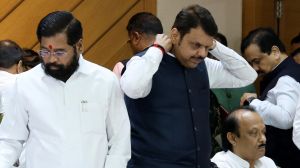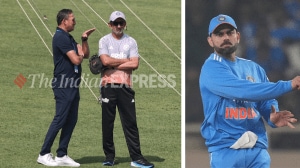Singles status on the rocks
New Delhi, Feb 10: The continuing doubles success of Leander Paes and Mahesh Bhupathi has had one unfortunate fall-out. All those titles ...

New Delhi, Feb 10: The continuing doubles success of Leander Paes and Mahesh Bhupathi has had one unfortunate fall-out. All those titles have helped to move the focus away from the relatively disappointing results Bhupathi has to show in his singles play. True, he has found little time to pursue his singles career as vigorously as he has been doing his doubles. But his performance at the last week’s Challenger in Calcutta — he lost to Paes in the final — went on to demonstrate he can keep his singles ranking with reasonable limits if only he plays more regularly.
In fact, Paes was rather disappointed that his doubles partner failed to put him away’ for the second time in two years. As Paes says, Bhupathi has everything that goes into making a good singles player big serve, big return. Then, what could be the reason why he has put his singles in the backburner?
Playing doubles makes good economic sense but that will not do justice to Bhupathi’s enormous talent. Says Paes, “I have tried to push himinto working hard on his physical fitness and bring back the realisation he can do well in singles. Because I think these are the factors where he is losing out. Hesh has to find the right attitude to find a way to improve. If he does well in singles as well it would be something great.”
Perhaps this lack of faith was quite evident when he said after the Calcutta final he didn’t quite believe he could beat Paes. That is also the reason why Bhupathi chose to skip the US Open and Australian Open and chose to play doubles with other partners when the two were not playing together. This was the time when Paes went in search of singles points. The success percentage could have much better but nevertheless he has kept his ranking inside the 100 — 84, according to the latest rankings.
Moreover, with their high doubles rankings, they need to play just the four Grand Slams and the Super Nines to be within earshot of the number one ranking. That gives them both enough time for singles which, in turn, would helpBhupathi get his fitness in order.
Unlike Paes, Bhupathi did not have to make his own decisions on the Tour. When Paes turned pro, he was the lone Indian on the ATP Tour struggling with his inconsistencies and inadequacies. He spend a good five to six years making most of his decisions before Bhupathi came along to strike a fruitful partnership. On the other hand, when Bhupathi turned pro Paes was firmly entrenched and the experience rubbed off on Bhupathi.
Unfortunately, there aren’t lot many years left off for them in singles and with the big match experience gained in doubles, Bhupathi seems to be at the crossroads of a career which could more distinguished if he clears the cobwebs from his mind.
When he relaxes on his rocking chair after he has finished with tennis, he shouldn’t look back and realise that he could have, perhaps, been a good singles player, too. That would be one of the biggest tragedies of Indian tennis.
- 01
- 02
- 03
- 04
- 05































